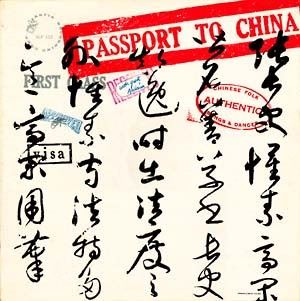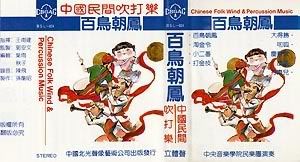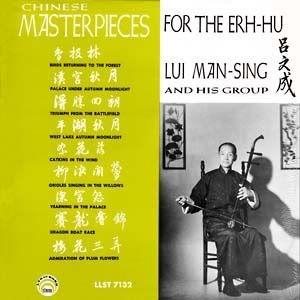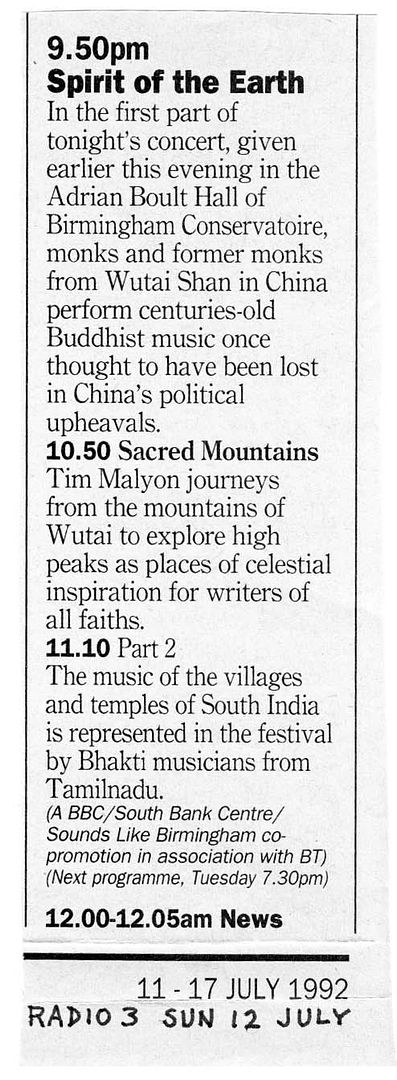
Passport to China (Supraphon/Artia LP c.1959)
Artist/Performers: Chinese National Song and Dance Ensembles, conductors: Chenkheng Yin, Tsu Te Fang
Album: Passport to China
Year: c. 1959 (Artia release)
Company: Supraphon, Artia (originally recorded by the Czech company Supraphon)
LP track list:
A1. Music to the Dance with Shawls - Chinese National Song and Dance Ensembles, Chenkheng Yin, conductor
A2. The Bubbling Brook - Chinese National Song and Dance Ensembles, Tsu Te Fang, conductor
A3. New Life - Chinese National Song and Dance Ensembles, Chenkheng Yin, conductor
B1. The River Tatu - Chinese National Song and Dance Ensembles, Tsu Te Fang, conductor
B2. Song of the Maiden Lan Chua - Chinese National Song and Dance Ensembles, Chenkheng Yin, conductor
B3. The Last Battle between Kingdoms Chun and Han - Chinese National Song and Dance Ensembles, Chenkheng Yin,conductor
Notes:
A Supraphon/Ramco production.
Recorded in Europe.
Artia ALP-112
An Aria "Cultural Exchange" Presentation.
Artia Recording Corp., 600 Fifth Avenue, New York.
This LP was reviewed in the July 1960 issue of Gramophone magazine, page 89:
http://www.gramophone.net/Issue/Page/June%201960/89/784338/NIGHTS+AT+THE+ROUND+TABLE
"NIGHTS AT THE ROUND TABLEBy W. A. CHISLETT
FROM CHINA, HUNGARY, RUMANIA AND U.S.S.R.
Passport to China; Authentic Chinese Folk Songs and Dances. Chinese National Song and Dance Ensembles conducted by Chenkheng Yin and Tsu Te Fang. Artia Q ALP112.
Gypsy King in Hi-Fi; Authentic Folk Songs and Dances of Hungary. Featuring Sandor Lakatos, Sandor Jaroka, Istvan Lukacs, Jozsef Fatyol, Sari Vorosy and Maria Berei. Artia Q ALP111.
Rumanian Folk Songs and Dances. Lautaru Barbu conducted by lone! Budlsteanu and Nicu Stanescu. Artia Q ALP105. The Red Army in Hi-Fi. Alexandrov Song and Dance Ensemble conducted by Boris Alexandrov. Artie Q ALP101. (All 12 in. 30s. plus Os. Pd. PT.).
The first thing to say about this very interesting group of records is that although they are American "Cultural Exchange" presentations they were recorded in Europe, even that of Chinese music. They are luxuriously packaged in thick cardboard containers which are more like albums than the ordinary sleeves.
"Passport to China" includes a lot of interesting notes about Chinese music in general and instruments in particular but nothing about the six pieces played, which is a pity, for I am no expert on Chinese music. I take this to be modern. Some of it suggests Western influences quite strongly and in places it is markedly akin to much of the popular music of Russia. The most prominent of the instruments are reeds, plucked strings, gongs, drums, cymbals and other members of the percussion family. There are also voices, male and female, solo and in chorus, and here I note particularly that there is rather less of the singing with cramped muscles and strained vocal chords than is the case in the older music of China. This is an interesting, exciting and in places quite fascinating record.
With "Gypsy King in Iii=Fi" we are on more familiar ground, but first of all attention should be called to odd discrepancies between the details of the artists as listed on the front cover and which are given above and those given in more detail inside and on the labels. Tv,.0 singers, Iren Meszaros, soprano, and Janos Csik, a pleasant voiced baritone, are included in both of the latter but not in the former. Mariz Berei is mentioned on the former but not on either of the latter; on the other hand there are in fact soloists who are not mentioned at all in two of the tracks, one of which may be Mario Berei. This is all unnecessarily confusing.
Sandor Lakatos, who plays nightly at Budapest's Astoria Bar, leads his Gypsy Orchestra on the first side and the leader on the reverse is Sandor Jaroka. How much is due to the playing and how much to the recording it is difficult to say, but the former achieves more pleasing and agreeable results as heard through the loudspeakers than the latter. Some top cut is desirable to tame the fierceness of the second side.
Much of this music goes back many years and snatches of melody, if no more, will be familiar to most via Liszt or Brahms. Best known Only One Girl which is charmingly sung by Sari Voros, but even more attractive to me are My Sweetheart mows in a Meadow in which the singer is Janos Csik, and the wild dance Verbunk with Fatyol as clarinet soloist. Fatyol exhibits his virtuosity also in Variations for Chardas, along with Lukacs who performs incredible feats on the cimbalom. All in all then this is much the mixture as before, but not quite, for I have heard many similar selections over the years that did not give the feeling of authenticity l whereas this one most certainly does."
I think the review sums up the LP very well; there is no information about either the pieces or the performers on the LP, just some somewhat dated descriptions of Chinese music in general. The LP is also mentioned in the 19 Oct 1959 issue (page 7 and 26) of Billboard magazine (available to read on Google Books).
Track B2. "Song of the Maiden Lan Chua" seems to be a version of the song "Lan Huahua".
Track B3. "The Last Battle between Kingdoms Chun and Han" is the well known pipa solo "Ambush on Ten Sides" (shí miàn mái fú 十面埋伏).
Going by the articles in Billboard magazine, I would guess the LP was released in the US by Artia Recording Corp of New York in 1959. However it seems the recording was made in Czechoslovakia by Supraphon, not necessarily in 1959.
Download link: http://sharebee.com/661d4bad
Filename: Passport to China (Supraphon LP c.1959).zip
Size: 27.68 MB



